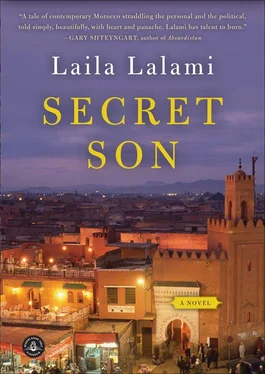“I found it okay, it’s just that I couldn’t find parking,” he said, also smiling. He glanced at Amal with a look that seemed to say, Can you believe she’s actually making conversation with me?
“Oh,” Malika said, turning to look at the valet station outside the window.
Fernando leaned in to kiss Amal, but she offered him her cheek. He let his arm rest on the back of her chair. In halting French, he asked Nabil whether he liked the city so far. “It’s not the first time I’ve been here,” Nabil responded in English. “I have visited three times before.”
“Of course,” Fernando said.
The waiter came by and Fernando scanned his menu quickly. When his turn came, he asked, “I was wondering, what exactly is the consom?”
“Consommé,” Nabil corrected him. “It’s a light soup. Like a broth,” he explained with a half smile. “Do you serve it hot or cold?” he asked the waiter.
“We serve it cold, sir.”
“Oh, good,” Nabil said.
“I’ll have that, please,” Fernando said, handing his menu to the waiter. “And the grilled fish as well, please.”
They toasted Amal with white wine. Then Malika asked Fernando what he did for a living. Amal looked at her, surprised. Why was she asking a question whose answer she already knew?
“I’m a photographer.”
“A photographer? How interesting. And where do you work?”
“I freelance for a weekly paper in Santa Monica.”
“Freelance,” Nabil repeated, as if he were learning a new word.
Then he asked about Fernando’s family, whether they lived close by, and Fernando had to explain that his parents were divorced when he was very young and that his father lived in the Bay Area, while his mother lived in New York with his younger sister. Malika asked him how his parents had met, and he said they had both been students at Berkeley in the early 1980s, married in graduate school, and divorced by the time they started working. Her parents were carefully picking Fernando apart, Amal knew, demonstrating to each other and to her that he did not fit in their world.
“THAT WASN’T SO BAD,” Fernando said as he parked his car outside Amal’s apartment after lunch.
Amal gave him a dark look. “You think?”
“What’s wrong?”
“Nothing.”
He sighed. “Why do you say “nothing’ when you don’t mean it?”
Amal opened the passenger-side door. “I should get going.”
“Wait,” he said, reaching over her and pulling the door shut. “Tell me what’s wrong.”
She stared at her shoes for a while, then in a soft voice said, “They want me to go back.”
“I know. How long will you be gone?”
“I don’t know.”
“What do you mean, you don’t know? Are you telling me you’re leaving for good?” His voice rose an octave.
“It’s all a mess,” Amal said, shaking her head, her own voice rising. “A huge mess, with my brother and everything. I’m going to meet him when I get there, and then, I don’t know, my mother wants my father to rework his will. It’s a mess.”
“So when are you coming back?”
“In the fall, maybe.”
“Maybe?”
“Please,” Amal said angrily. “Don’t be like this. Don’t ask me to give you answers. Right now, I have no answers.” She opened her door again. “Look, maybe you can visit me there.”
“Yeah, like you say, maybe.”
“What’s that supposed to mean?”
“Nothing.” And then he chuckled at the word he’d used. He had his hands on the steering wheel, and now he let his head rest upon it.
Amal felt yearning for him light inside her. She touched his arm, but he didn’t look up. She was afraid to say something that would break her resolve. Now there was the task of saying good-bye, the task of being part of a family. “I’ll call you tomorrow,” she said softly. Then she stepped out of the car and walked up the steps to her building. She did not hear his engine start until after she had already gone inside her apartment and dropped, fully clothed, on her bed.
“IT TOOK A WHILE to make all two hundred copies,” Youssef said as he entered Amina Benjelloun’s office. He had spent the past hour at the copy shop, where each machine the clerk used seemed to be afflicted with a different problem — low toner or malfunctioning feeder — so that the job had to be done manually. He placed the conference programs on her desk and was about to leave when she stood up. “I’m sorry to have to do this,” she said, “but I have to let you go.”
Was this a joke? He was only about thirty minutes late on this task, and in any case it wasn’t his fault. Perhaps the secretary was in on it, waiting behind the door, ready to open it and start laughing with Benjelloun at the prank they had pulled. He was already forcing himself to smile, to show that he could be a good sport, when Benjelloun picked up a sealed envelope from the desk and handed it to him. “Your pay for this month.”
“Wait,” he said. “You can’t be serious. Why are you firing me?”
“We just don’t need you anymore.”
Everything around him — the paper-covered desk, the diplomas on the wall, the potted plants — seemed to recede into the background. Her face suddenly appeared magnified. Mesmerized, he stared at her broad forehead, the scratch along the top of her tortoiseshell glasses, the beauty mark at the base of her neck, which he had never noticed before. It took a moment for words to form in his mind and to string together into a sentence. “I didn’t do anything wrong.”
“Maybe not. But unfortunately we no longer need you. Don’t forget to turn in your badge on your way out.” He detected no satisfaction in the way she said this, even though she had never liked him and had not wanted him on her team. But this was unfair; he had worked with dedication, neglecting his studies to focus on his job, and now she was firing him. Without realizing it, he stepped forward and gripped the back of the chair before him. Had he looked down he would have seen his knuckles turn white from the effort.
“I am sorry,” she said.
“I didn’t do anything wrong. I think you should reconsider.”
“Are we going to have a problem?”
“Your boss will find out.”
“If you don’t leave, I will have to call security.”
Maybe it was a mistake, Youssef thought. She was told to cut down on her staff, and forgot that Nabil Amrani himself had asked her to give Youssef a job. It had been a long while after all, and she had hired two other people since she took him on. “Do you have any idea who you’re talking to?” he asked.
She gave him a half smile. “I know exactly who I’m talking to.”
Youssef looked at her uncomprehendingly. When it was clear he was not going to move, Benjelloun picked up the phone and pressed a button, whispering into the receiver. A moment later, the door flew open and two security guards rushed in. Youssef turned around to face them. “A-’ibad allah!” he said, finally raising his voice. The guards took him out of the office and into the hallway. “What is this hogra?” he yelled. “She fired me for no reason!” He turned to look at the men who held him, but each one avoided his eyes, as if they had known all along that he was getting fired. They took off his badge and pushed him out into the street. He fell on the pavement, one knee under him, the other twisted in a painful arc. He limped across the street, feeling as though he were trapped in a film in which he was unable to deliver his own lines and was forced to say another character’s dialogue instead. Something was wrong.

Читать дальше













